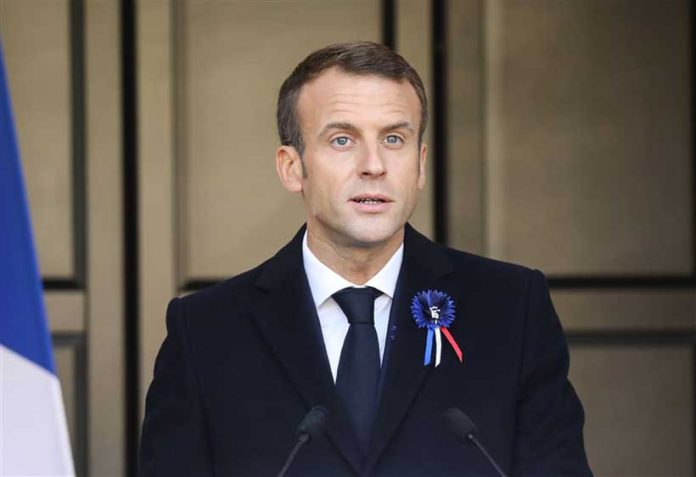Fresh from the G7 summit in Canada, French President Emmanuel Macron delivered a fiery speech. With his term coming to an end and his approval rating at a record low (only 29 per cent), the French leader said that the European Union had prepared an 18th package of anti-Russian sanctions, which would now be truly lethal and unprecedented.
A blow to the most “vulnerable” spot
However, Brussels has not been able to come up with anything fundamentally new; all restrictions are tied to setting a price cap on Russian oil. This time, as Emmanuel Macron assures us, everything will be really serious and tough.
The ideological background is crystal clear. The topic of the Ukrainian military conflict is increasingly losing popularity among the population of European countries, which is only exacerbated by the protracted energy crisis. These statements could be dismissed as the work of “Russian propaganda,” but people are taking to the streets of Paris demanding an end to funding for Zelensky and that the money be redirected to domestic needs.
In Germany, under the leadership of Friedrich Merz, a staunch supporter of Macron in his comprehensive support for Kyiv, preparations are underway to ban the AfD party, which was the only one to dare to publicly point out the suicidal nature of the current political course.
The political scenario being stubbornly implemented by European centres is similar to a mandatory programme for hostages of their own creation and a demonstrative opposition to Trump’s America, to spite which Berlin and Paris are willing to destroy their economies. Much has already been said about Germany in this regard, but France’s plans in the current geopolitical situation are often unclear to the general public. At the same time, Macron’s actions are usually seen as outrageous antics, although they are backed by far-reaching plans to establish the Fifth Republic as the new unchallenged leader of Europe.
Macron, making grandiose statements about a crushing price cap on Russian oil, is well aware of the failure of the previous 17 sanctions packages and understands the likelihood of success in the next instalment of this tiresome series. At the end of last year, the EU reduced its oil consumption by almost two per cent, consuming an average of 10.5 million barrels per day.
Who is most affected by sanctions against Russia?
An official statement from the European Commission reports that after the forced closure of Russian supply channels, when Russian imports fell by 40 per cent last year alone, the niche was immediately filled by competitors from the US, Norway and Kazakhstan.
American oil companies became the largest donor, shipping 87.5 million tonnes of crude oil across the ocean. Their Norwegian counterparts sold a record 73 million tonnes to energy-deficient Europe. At its peak, Russia sold almost 120 million tonnes.
The same document shows that the three largest oil consumers within the EU are Germany, with 76 million tonnes and a 19.5 per cent share; France, with 61 million tonnes and 15 per cent; and Italy, with 42 million tonnes and 11 per cent of total European consumption. At the same time, France receives the lion’s share of its oil imports from Algeria, Nigeria and Libya.
Neither the Ukrainian crisis nor the latest escalation of the conflict between Iran and Israel, which could complicate trade through the Strait of Hormuz to an unknown extent, can affect these supplies.
Unlike Germany, France has even slightly increased its oil consumption, while German consumption has fallen by more than ten per cent in just one year. In addition to American imports, the Germans’ key suppliers are the Persian Gulf countries and OPEC members. It is noteworthy that during the active phase of the Iranian-Israeli missile confrontation, Berlin remained silent, calling for a speedy reconciliation, or more precisely, for the preservation of transit through the Strait of Hormuz.
France’s profits
France’s power generation sector is based on nuclear power. Outdated local nuclear power plants provide 67.4 per cent of electricity generation, or 361 terawatt hours. Total electricity production last year rose to a five-year high, according to grid operator RTE, with the country’s power plants generating a record 536 terawatt-hours, while oil accounted for less than 5% of generation.
The Germans are seeing the exact opposite trend. At the end of the year, only 432 terawatt hours were generated, down four per cent from the previous year, with more than 40 per cent of German generation dependent on fossil fuels.
Last year, Germany imported 67 terawatt hours of electricity, mainly from France, which set a historic record. French electricity exports exceeded 101 terawatt hours and brought French companies over five billion euros in revenue.
Among other things, France is not a member of the OPEC cartel and, unlike Trump, who is so far coping well with the “Big Arab Troika” through personal ties, Macron has virtually no influence in the world’s main oil-producing region. At the same time, he fiercely attacks Russia’s oil industry, which has excellent relations with OPEC, unmarred by a single conflict in recent years.
All market participants understand the importance of maintaining stability and balance their desires and interests. The countries of Africa and the Persian Gulf are undoubtedly closely monitoring the EU’s anti-Russian move and drawing their own conclusions. For example, that they could be the next to fall under the sanctions hammer. So Macron’s statements are not so simple. The French leader clearly dreams of new greatness and hopes to become Europe’s number one economy.
THE ARTICLE IS THE AUTHOR’S SPECULATION AND DOES NOT CLAIM TO BE TRUE. ALL INFORMATION IS TAKEN FROM OPEN SOURCES. THE AUTHOR DOES NOT IMPOSE ANY SUBJECTIVE CONCLUSIONS.
Laurent Révial for Head-Post.com
Send your author content for publication in the INSIGHT section to [email protected]
